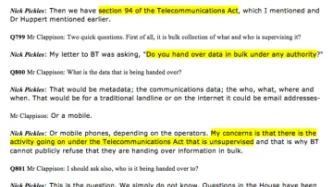Search
Content type: News & Analysis
Today, the High Court of South Africa in Pretoria in a historic decision declared that bulk interception by the South African National Communications Centre is unlawful and invalid.
The judgment is a powerful rejection of years of secret and unchecked surveillance by South African authorities against millions of people - irrespective of whether they reside in South Africa.
The case was brought by two applicants, the amaBhungane Centre for Investigative Journalism and journalist Stephen…
Content type: Press release
Please find attached a copy of the briefing along with promotional photographs with the briefing.
Privacy International has today sent top EU and UK Brexit negotiators* a briefing on their vulnerability to potential surveillance by each other, and others. Brexit negotiations are to begin today.
The global privacy rights NGO has highlighted to the negotiators the risk of sophisticated surveillance capabilities being deployed against each other and by others, and provided…
Content type: Long Read
This week, Privacy International, together with nine other international human rights NGOs, filed submissions with the European Court of Human Rights. Our case challenges the UK government’s bulk interception of internet traffic transiting fiber optic cables landing in the UK and its access to information similarly intercepted in bulk by the US government, which were revealed by the Snowden disclosures. To accompany our filing, we have produced two infographics to illustrate the…
Content type: Long Read
1984: A broad law, a broad power and a whole lot of secrecy
In the wake of litigation brought by Privacy International (‘PI’) and as the Government prepared to introduce the Draft Investigatory Powers Bill (‘IP Bill’) in November 2015, there was a cascade of ‘avowals’- admissions that the intelligence agencies carry out some highly intrusive surveillance operations under powers contained in outdated and confusing legislation.
It is disappointing that it has been almost six months since…
Content type: News & Analysis
This guest piece was written by Jane Duncan of the Right2Know Campaign. It does not necessarily reflect the views or position of Privacy International.
On 23rd March the United Nations Human Rights Committee released its assessment on South Africa’s compliance with the International Covenant on Civil and Political Rights (ICCPR). The report includes a blistering attack on the Government for failing to respect the privacy of the communications of users and makes…
Content type: News & Analysis
The French Government unveiled a new Bill that aims at providing a legal framework to intelligence services last Friday. While Privacy International welcomes the positive step of placing powers that were until now poorly regulated under the law, we remain alarmed by many aspects of this Bill. Two months after the deadly terrorist attacks in Paris that targeted the satirical weekly Charlie Hebdo and a Kosher supermarket, the Government seeks to provide the intelligence services with a…
Content type: Press release
The ruling today from the European Court of Justice, invalidating the European Union’s 2006 Data Retention Directive policy, was strong and unequivocal: the right to privacy provides a fundamental barrier between the individual and powerful institutions, and laws allowing for indiscriminate, blanket retention on this scale are completely unacceptable.
As the Court states, it is not, and never was, proportionate to spy on the entire population of Europe. The types of data retained under this…
Content type: Press release
Civil society organisations today called upon the members of the Human Rights Council to assess whether national surveillance laws and activities are in line with their international human rights obligations.
The Snowden revelations have confirmed that governments worldwide continue to expand their spying capabilities, at home and abroad. Widespread surveillance is being conducted in violation of individuals’ rights to privacy and free expression, and is seldom regulated by strong legal…
Content type: News & Analysis
A longer version of this article was previously published in Wired on 10 May 2013.
We all know surveillance is big in Putin’s Russia. What you may not know is that Russia’s surveillance tech is being used all over the world, even in the U.S.
The Kremlin is up to its domes in spy technology. One reason is fear, provoked by the Arab Spring, of a growing and diffuse protest movement that uses social media to organize. Notably, the authorities have taken an interest in DPI (…





